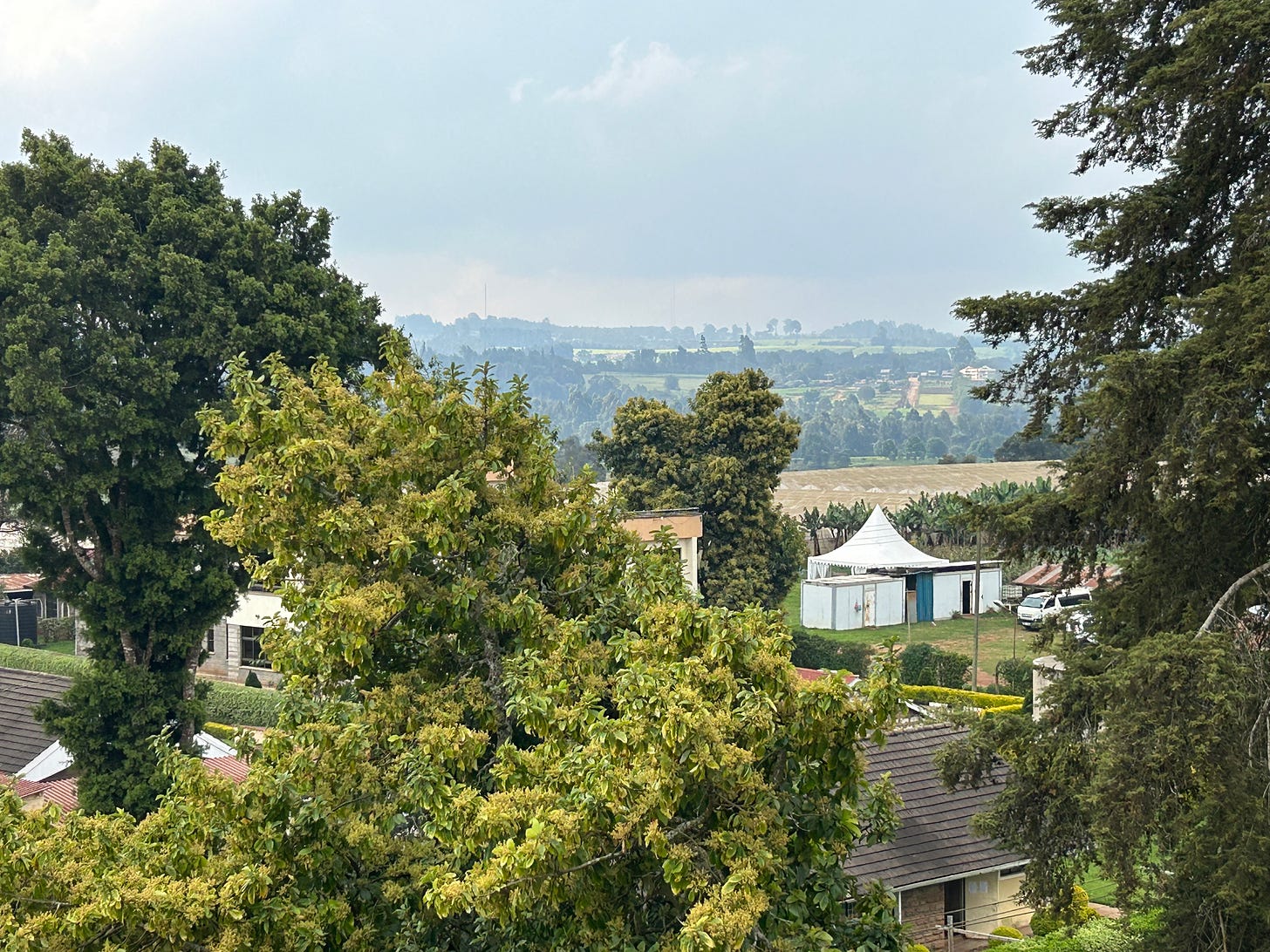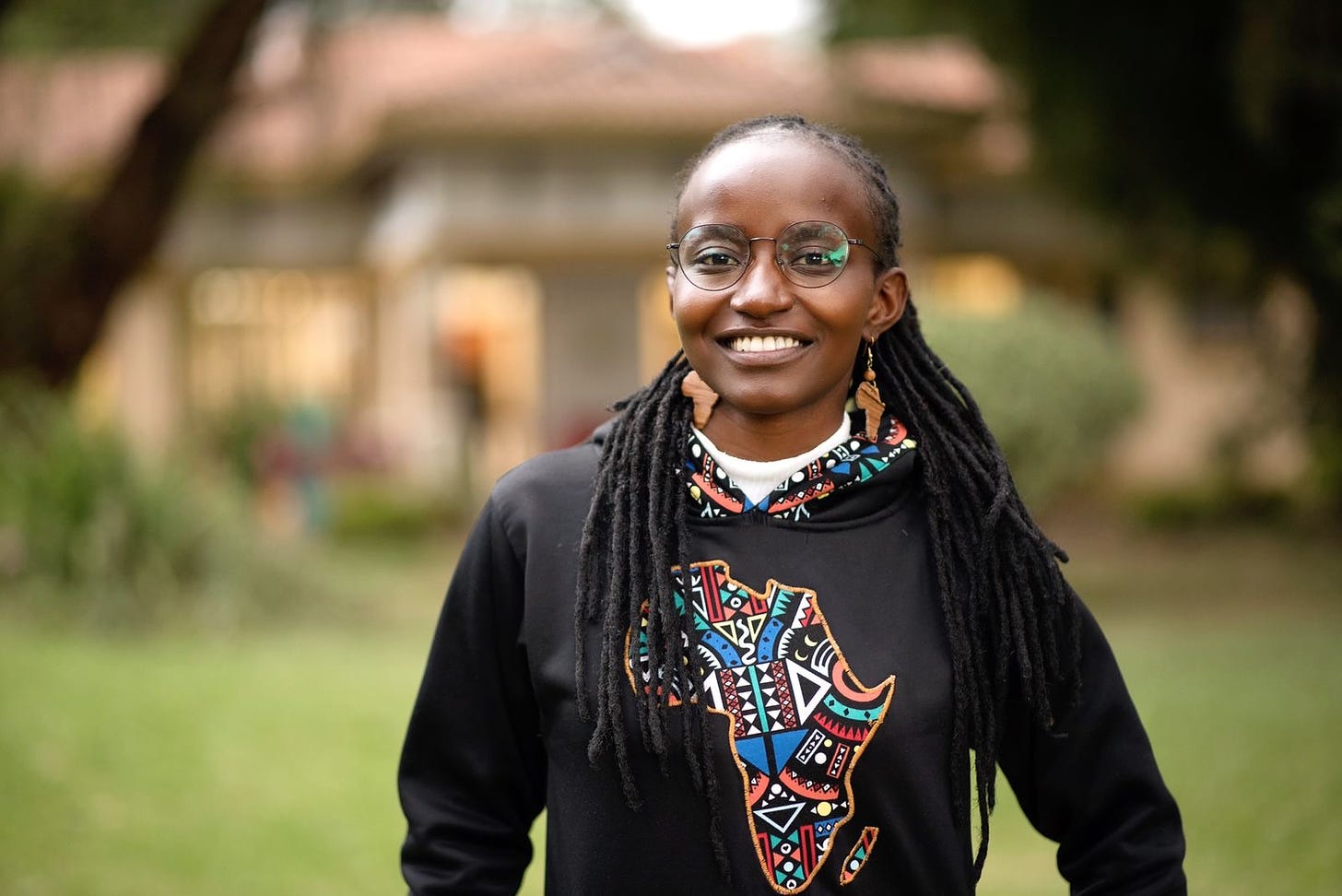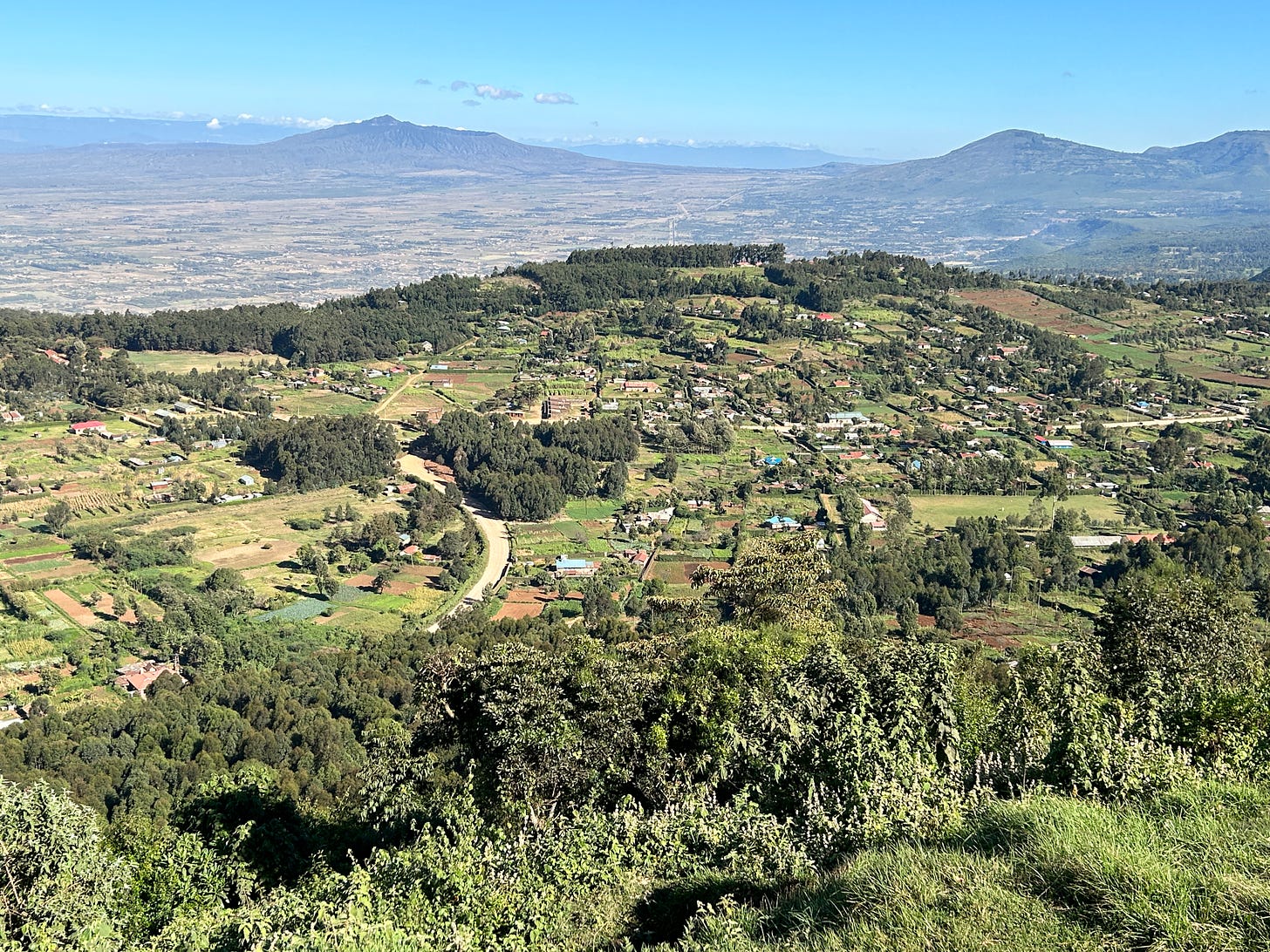Let Us Hold Life Higher Than Profits
The Call to Action from the Gen Z Occupy Movement in Kenya
I was away in Kenya for two weeks last month, serving as chaplain to the students of GEM School – the Ecumenical School on Governance, Economics, and Management for an Economy of Life. It was a transformative experience for me! I learned more about the intersections between economic justice and the climate crisis, as well as what churches, civil society organizations, and people on the ground are doing to work for justice and peace for all, especially in the global South. I met passionate colleagues and made friends with people from around the world. I learned from people in contexts both similar and different from mine and came home overflowing with the learning, worship, joy, and relationships made. As I offered a travel blessing to each participant on our last day, I felt immeasurably blessed, and changed, by my experiences in Kenya.
We are in a climate and ecological crisis, and it’s all hands on deck... Subscribe to join a community of people of faith and like-minded people seeking to make change!
Want to support my work but not ready or able to subscribe yet? You can make a one-time contribution. Click here:
How do I bring what I have learned back “into my context,” as we called it at the GEM School? In the weeks ahead, I will be unpacking critical ideas about global inequities and the climate emergency for those of us here, people who are primarily located in the global North, so that we can allow those ideas to shape our faith-based climate action and make us more effective in responding to the climate emergency as it affects those most impacted.
Before you hear my thoughts, however, I want you to hear from someone who is a leader in Kenya. Before my trip, I learned in the news about protests by young Kenyans in Nairobi against a proposed finance bill. Although I read a few articles online, I knew next to nothing about the political situation in Kenya and the context in which these protests were happening. Jackie, one of the GEM students and a Kenyan, spoke to our group about the demonstrations, of which she is a leader. Later, she graciously agreed to sit down and be interviewed about the protests and what they mean for young Kenyans and the future of the country. The protests are the spark of what’s been dubbed the Gen Z Occupy Movement. Here is my interview with her (edited for length and clarity). I hope that you can feel the power and conviction of Jackie, through these written words, that I experienced in speaking with her.
New here? I am thrilled that you have joined me and the rest of the Faith. Climate Crisis. Action community. Want to learn more about me and what this newsletter is about?
No climate justice in the global North is sufficient without a fulsome understanding of how the climate emergency intersects with economic injustice in the global South. Take some time to learn more about how this impacts Kenya and other places. This is your Friday Nudge.
Let Us Hold Life Higher Than Profits: Interview with Rev. Jackline Makena on the Gen Z Occupy Movement
Jessica: Hi Jackie! Last week at GEM School, we heard about the Gen Z [pronounced Gen-Zee] Occupy Movement that’s happening in Kenya right now. I know that you’ve been a part of this movement. Thank you so much for being willing to speak with me. First of all, why don’t you tell me who you are?
Jackie: My name is Jackline Makena. I am a theologian, a social justice activist, and also a climate justice activist. My theological lens is from African women's theology. I’m also very much interested in and studied ecotheology. I teach part-time here at St. Paul’s University [in Limuru, Kenya]. I'm also a clergy of the Methodist Church in Kenya, and the Vice-Moderator of the World Council of Churches Faith and Order Commission.
Jessica: I know that you have been involved in the Gen Z Occupy Movement here. As you know, my readers are mainly in North America; can you describe it for them?
Jackie: The Gen Z movement started as a movement led by young people who are tired of the economic injustices that are happening in Kenya. It was triggered by the finance bill that was being voted on in parliament. This bill included a lot of tax hikes on basic necessities like food, sanitary towels, and other things that people need for survival. The majority of people here in Kenya are young; they are 35 years and below. So, they feel that life is unbearable. The amount of money that is needed for survival here, it's not something that they can afford because of the high level of unemployment.
There is also a lack of opportunities for young people. And they felt that enough is enough of this. Another thing also that led to and intensified the Gen Z movement is that we young people have been doing research, and we noticed that the IMF has been taking advantage of the Kenyan economy by giving money which is not accounted for in terms of debt. And this debt has a very high interest rate; we just live paying debt. Almost 56% of our GDP is used to pay debts, and these debts are illegitimate. We don't see development when these monies are borrowed. Some of it is not even reflected in the budget.
So, we felt that enough is enough! We need justice. We need to be told the truth. We need transparency. And what we are doing, and we continue to do, is to hold our leaders accountable.
“Enough is enough! We need justice.”
June 25
On the 25th of June, the finance bill was being voted on. The majority of the members of parliament voted yes for the bill to be ascended by the president. That was the time when almost 1 million young people in Kenya were in Nairobi town and they occupied the parliament. They got into the parliament [building] after the MPs voted, [and while] they were still in session.
And they took the mace, the symbol of power for the speaker. No decision can be made when the mace is not there. If a law is made and it is passed, the speaker must have the mace for it to be passed. So, the young people took the symbol of power from the parliament! And then, due to a lot of pressure that was there from young people, from celebrities, from everybody, the president declined to sign the bill.
But then apart from the [finance] bill, there's a lot of climate injustice. So many people are given trees for free. But then when these trees are given, there's a form that they're supposed to sign. [The document they sign shows that] any credit, carbon credit, doesn't belong to the people who have planted the trees. It belongs to the people who have given the trees for free.
[This is part of] a big move of neocolonialism. Leaders are being used to colonize us. And I think this is the main reason why young people keep on calling out these injustices.
Occupy the Churches
They keep on, they pressure even the church because at that point when we were demonstrating the church was silent. The church did not give any statement when we began. No support for us. And we said we will occupy the churches as well. We are not leaving any stone unturned.
We are occupying everywhere, holding our religious leaders accountable because the church is the prophetic voice of the society and if the church doesn't say anything about all these inhumane things that are happening then we don't see the essence of it existing. So, we called out the churches and after that, I think they started responding but I would say that was a reactive move. We expect the church to be proactive because the church is a space where justice is supposed to be achieved. The church is there to hold people accountable.
The Gen Z Movement is a Consciousness
The Gen Z movement hasn’t died; it's still alive. It is a consciousness. It is an idea. It is something we speak about, but then the methodologies are different. Currently, we are doing mass education, educating our people on all these policies are about, all these bills are about, [and] educating them of their rights.
The Gen Z movement is alive; it is a consciousness.
And we know a lot that is happening in our country. A lot of land that has been taken, dubbed multinational lands, [but it’s] land that actually belongs to people.1
Our minerals are being taken away. There's a lot of extraction that is happening here. And we know that 80 percent of carbon emissions in the world comes from fossil fuel extraction. We know that. And this is what we are saying: Stop destroying our country! We don't have any other home. This is the only home that we know. And if we continue like this, we, the future generations won't have anywhere to live.
And what we say is that we are not doing it for us. We might not live to see the fruits, but we are securing them for future generations. Calling out even theological institutions, this is the time to decolonize our curriculum. Our curriculums should reflect our lived realities, our contextual realities. So there's a lot that we are asking for.
Because we love our country! We need reform. We need to be free. We need dignity to be upheld. That’s what the Gen Z movement is about.
Government Response
Jessica: When you took to the streets [and] when you occupied parliament, how did the government respond?
Jackie: The government responded so rudely. I remember that very night.
The statement from the president was a very rude statement. He declared a state of emergency. He said that we are causing anarchy. He called us criminals and all those things. But we still persisted! So young people died. They used live bullets, water cannons [and] tear gas.
But that did not make us lose hope, because what we are advocating for is a matter of life and death. Whether we die on the streets or not, if the system continues the way it is, we will die eventually. As I've said before, we are not even doing it for us. It's for our future generations. We are doing it for Mother Earth.
And I think Mother Earth, I'm sorry to use this word, has been raped severely by humans and activities that we do. Mother Earth is wounded. Mother Earth is almost dying. Because we are strangling Mother Earth. And what we are saying is not only justice for humans but justice for nature. These extractions are destroying a lot of things.
The ecosystem is [being] destroyed currently. Our biodiversity is dying. We need biodiversity for survival. Nature doesn't need us to survive. So we need to let nature be.
Ready To Die for Freedom
Jessica: I know that our friend [from Kenya] said to me last week, that when the Gen Z protesters are going down [to the protests], they go down knowing they might not come back alive.
Jackie: Yes. Actually, there are people who say, when we were going to protest, that “this might be the last meal that I'm taking.” And there's even a person who had worn a sack [on which it was] written, “Mama, if I don't come back, know that I died fighting for your rights.” We are bold. We don't fear death. Let me tell you, there's nothing as bad as someone who does not fear death. The young people of this country, we are ready to die for our freedom.
When we attained independence from colonialism, people died. They shed blood. For us to attain physical independence. And this time around we’re saying we have the physical independence, but we want other independence. We want financial [and] economic independence. We want mental independence. We don't have that yet.
And we are willing to shed our blood for a country to be free, free from perpetrators of injustices, free from perpetual slavery.
Women in this country are suffering. I'll give a particular example of women who are working in tea plantations, flower plantations, and coffee plantations, paying less, being paid less money, being exploited every day, sexual exploitation and other sorts of exploitation. Tell me what that is, if not slavery. They are being enslaved in their farms, which they don't own because their lands were taken. People are being trafficked, right, left and centre.
Yeah, we have a lot to do here. We’re not willing to go and work abroad. We want to build our nation. We want to use our expertise, and our skills to build our land. That is what we told the president
It was a time bomb to go to a point where we could not take in anymore. We have the information, we have the knowledge, we've studied, we've watched, we've seen, and we [ask] for how long will these injustices continue? For how long will this systemic exploitation continue?
Jessica: How old are you, Jackie?
Jackie: I am 26.
Radical Discipleship
Jessica: What sustains you in this? What keeps you going?
Jackie: Life. If I don't do this, I won't live. Because it's either I do this or die. Let me explain. My future is not secure. I've gone to school, yes, but I cannot work because there are no job opportunities, right? Food insecurity. Nature is destroyed. We've been having extreme weather conditions. In 2022 there was no rain here in Kenya. There was a shortage of food. Early this year, there were floods. People died. Our primary source of income is agriculture. If things are so extreme, now that is caused by climate change, then now we also have economic difficulties.
Tell me: How we will survive? So it's either I advocate for this, or I, my people and generations to come will be exterminated from the world. So that's why I choose to do this and I choose it as the way Jesus chose. God chose to come and save the world. He died so that we can have life. If this, if this will cost me death, then I'm willing for people to have life.
“If I don't do this, I won't live.”
Jessica: This interview is going to be in my newsletter and my work as I think I told you is all about understanding the need to take climate and other action as discipleship. And it seems to me that you are living out that very radical discipleship that Jesus has called us all to.
Jackie: Yeah.
Global North Call to Action
Jessica: And I'm hearing similarities with the global movement to support Palestine. Like there's this rising up of Gen Z communities around the world saying no more to injustice. When I listen to you, I hear some of those connections. Is there a call to action you want to make to those of us in the global North?
Jackie: Yes. A call to action to the global North and the entire world is that let us hold life higher than profits. Let us value other human beings. We are all human. We all have this single life to live. But the world, the way it is, and the way systems are curated, is that we all [value] money higher than life, than nature, but failing to understand that no one will live forever. And even after amassing all this wealth and money, you leave it here.
So my call to action is please let us put the earth, put the people higher than profit and commodities. Let us stop commercializing people. Let us stop misusing, and abusing other human beings. And it is a sin that the world should repent. We've caused it in different ways, sometimes unknowingly. But it's time for us to be conscious.
Ask yourself: Is what I am doing endangering another person's life? What will I gain from it? After all this wealth, will I live forever? We have enough resources in the world to share and everyone will live comfortably. Let us make each other's lives easier.
Jessica: Thank you, Jackie.
Jackie: You're welcome.
“Let us hold people higher than profits.” - Rev. Jackie Makena
What surprises you most about what Jackie says?
Want to hear more from Jackie? Check out this interview with the WCC:
Jackie is referring to the land grabbing that is occurring by foreign multinational governments in countries in Africa such as Kenya. For more: https://afjn.org/multi-national-corporations-land-grabbing-in-africa/.







